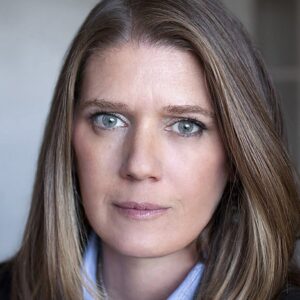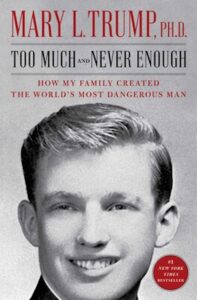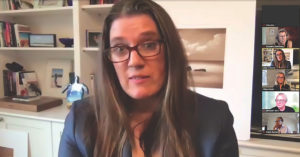Mary Trump has been coming to Provincetown since she was a six-year-old at Cape Cod Sea Camps in Brewster. In the early 2000s, she briefly owned Kensington Gardens, then a B&B, in the West End, with an ex-partner. Now, former president Donald Trump’s estranged niece is here for Women’s Week. She’s speaking at town hall on Oct. 17.

Trump is a clinical psychologist and author of three books about the former president and the Trump family. She was a primary source for the New York Times’s Pulitzer Prize-winning investigation into Trump’s finances and remains the target of a lawsuit her uncle filed against her and the Times.
Four years ago, Mary Trump’s Too Much and Never Enough described how the former president’s family money ensured he would never have to survive by his own wits in the real world. “But will the real world survive Donald Trump?” asked Jennifer Szalai in a September 2020 review in the Times. “Mary says that American democracy will not if he gets a second term.”

Now, Mary tells the Independent, “We let our guard down and thought, ‘Oh, Biden won, everything’s fine,’ but the danger we’re in is more serious. Everything’s at stake, really.”
Q: With just a few weeks to go before the election, why speak to people in what is arguably the bluest town in the bluest state in the country?
Because the fight really begins on Nov. 6, if we win. We saw this the other day, on the very first day of the Supreme Court’s new term. We know that they’re destroying more rights for women — the Court let stand a decision barring emergency abortions in Texas — and they’re going to look at the rights of trans people. We can only imagine how they’re going to rule on those. It’s a sprint now, but the project of getting where our democracy needs to be is a marathon.
Q: You’re here for Women’s Week, so I wanted to ask about the role of women in this election. I’ve heard people say they can’t understand how a woman could support Donald Trump, but there are plenty of women at Trump rallies.
We underestimate the internalized misogyny that a lot of women have. Many white women have traditionally voted Republican, and I’m not sure why that would change. I do think that the way the U.S. Circuit Court of Appeals and the Supreme Court have been overstepping on the abortion rights issue is going to give us a bit of an advantage, because I think it’s making some women pay attention in a way they may not have otherwise.
Q: What would you say to women at a Trump rally if you had the chance? Or would you not even try?
I don’t know. I think that project might have to wait until after the election. Back in 2020, I said we don’t have the luxury of trying to convince people who are that bought in. But we can’t give up hope, because while lots of Donald’s supporters are the worst among us — the neo-Nazis, Christian nationalists, racists — a lot of them are people who’ve been lied to by Fox News and by elected Republicans.
Q: You wrote about Donald Trump in your 2020 book that “The walls of his very expensive and well-guarded cell are starting to disintegrate.” Looking back now, do you feel those walls have not disintegrated as you then imagined they would?
Part of the reason he’s maintained viability, even though he, as a human being, is sort of disintegrating before our eyes, is because of how propped up he’s been by the Republican Party and now the judiciary and the Supreme Court. It’s mind-boggling how many people in positions of power have kept Donald Trump in this thing and out of prison.
Q: What do you mean when you say he’s disintegrating?
I wrote in the first book that Donald has always been institutionalized, by which I mean living in very closed environments. He’s never had to function independently. He went from being protected by my grandfather to being protected by the banks to being protected by the Republican Party and the Supreme Court. But he’s becoming delusional. The levels of disinhibition, the violence of his language, his tangential thinking, his entire sense of himself is under assault and that takes a toll.
Q: You write about the time when your uncle introduced you to his wife Melania. Can you describe what happened?
It was Father’s Day, and we held it at Donald’s apartment at Trump Tower. For some reason I was the first person to arrive. We were sitting in the foyer. Melania was there but didn’t say a word, and Donald started talking about how he hired me to write one of his books. He told her how after college I had hit rock bottom and I was doing drugs. Melania said, “Really?” I said it was a bad time, but no, I wasn’t doing drugs.
But Donald likes comeback stories. He thinks he had this great comeback. And he thinks the comeback looks better the worse things were. So, it wasn’t enough that I was having a hard time. I also had to be a drug addict. That made the comeback an even greater accomplishment, but the real point of his story was, “Mary was a mess, and I gave her a shot.”
Q: How did this kind of family dysfunction affect you, shape who you are?
Life has been a challenge for me because I didn’t get a lot of the tools people typically get from their families. It was a very cold, unaffectionate family with warped ideas about money. I can be very black-and-white about things I think are right or wrong, which makes it hard to negotiate things sometimes. But it’s because the family had no moral code.
Q: An adjective to describe how you are feeling about the election, a few weeks out.
It depends on the day. I’m going to give you an adverb and an adjective: cautiously hopeful. I refuse to believe this country would choose him over her after everything we’ve been through.

